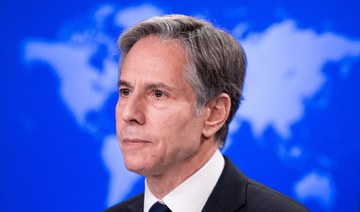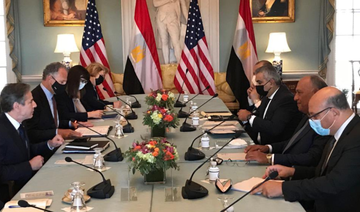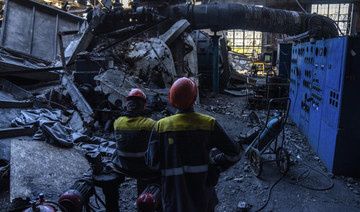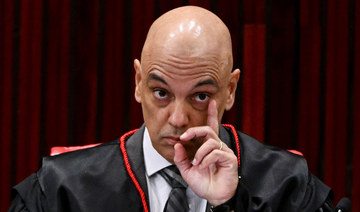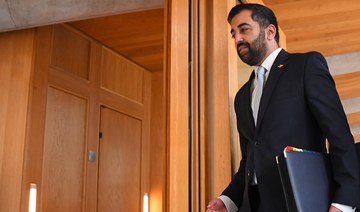WASHINGTON: The Biden administration’s competition with China for influence didn’t get off to a great start in Africa.
In August, the top US diplomat planned a visit, only to postpone it because of the turmoil in Afghanistan that preoccupied Washington. Now, three months later and as two significant African crises worsen, Secretary of State Antony Blinken will try again this week to signal the administration’s “America is back” message to the continent.
Despite its importance in the US-China rivalry, Africa has often been overshadowed amid more pressing issues in Europe, Asia, the Middle East and even Latin America. Thus, Blinken’s trip is aimed in part at raising Washington’s profile as a player in regional and international initiatives to restore peace and promote democracy as it competes with China.
That’s been a hard sell despite massive US contributions of money and vaccines to fight the coronavirus pandemic and other infectious diseases. All the while, China is pumping billions into African energy, infrastructure and other projects that Washington sees as rip-offs designed to take advantage of developing nations.
More immediately, Blinken is looking to boost thus-far unsuccessful US diplomatic efforts to resolve deepening conflicts in Ethiopia and Sudan and counter growing insurgencies elsewhere. His three-nation tour — to Kenya, Nigeria and Senegal — follows months of administration attempts to ease both situations that have yet to bear fruit despite frequent lower-level interventions.
“Our intensive diplomacy there is ongoing, and through the trip, we would like to demonstrate that our commitment to African partnerships and African solutions to African challenges is enduring and will continue while we continue our intensive efforts with our African partners and likemindeds to address the difficult challenges in Ethiopia and certainly Sudan,” said Ervin Massinga, a top US diplomat for Africa.
Blinken begins his tour in Kenya, a key player in both neighboring Ethiopia and Sudan and currently a member of the UN Security Council. Kenya also has deep interests in Somalia, which it borders and which has been wracked by violence and instability for decades.
Yet months of engagement by the administration, including an August visit to Ethiopia by US Agency for International Development administrator Samantha Power, several trips to Addis Ababa and Nairobi by Biden’s special envoy for the Horn of Africa, Jeff Feltman, and a current visit to Sudan by the top diplomat for Africa, have produced little progress.
Instead, conflict in Ethiopia has escalated between Prime Minister Abiy Ahmed’s government and the leaders in the northern Tigray region, who once dominated the government, with rebels now advancing on the capital amid increasingly dire warnings from the US and others for foreigners to leave.
Those tensions, which some fear could escalate into mass inter-ethnic killings in Africa’s second-most populated country, exploded into war last year, with thousands killed, many thousands more detained and millions displaced. Blinken will underscore those concerns when he meets Kenyan President Uhuru Kenyatta on Wednesday, according to State Department spokesman Ned Price.
While holding out hope that a window of opportunity for a resolution still exists, the Biden administration has moved toward sanctions, announcing the expulsion of Ethiopia from a US-Africa trade pact and hitting, at least at first, leaders and the military of neighboring Eritrea with penalties for intervening in the conflict on Ethiopia’s behalf. Sanctions against Ethiopian officials, including Abiy, a Nobel Peace laureate, are possible.
Ethiopia has condemned the sanctions and stepped up its criticism of “meddling” in its internal affairs. And in Addis Ababa, the headquarters of the African Union, and elsewhere, there is skepticism and hostility to US pressure for an immediate cease-fire and talks despite America being the country’s largest aid donor.
As Feltman has shuttled between Nairobi and Addis Ababa with an eye toward easing tensions in Ethiopia, he and the administration have also been confounded by developments in Sudan, where a military coup last month toppled a civilian-led government that was making significant strides in restoring long-strained ties with the US
Just last week, coup leader Gen. Abdel-Fattah Burhan tightened his grip on power, reappointing himself as the chairmen of a new sovereign council. The move was criticized by the US and other Western governments despite saying it would appoint a civilian government in the coming days.
Burhan notably moved against civilian Prime Minister Abdalla Hamdok just hours after Feltman had left Khartoum on a mission intended to resolve escalating tensions between them. The US has retaliated against the coup by suspending $700 million in direct financial assistance to Sudan. Further moves, including a slowdown or reversal of a multiyear rapprochement with the government, could also be in the works without changes.
The top US diplomat for Africa, Molly Phee, is currently in Khartoum and will be joining Blinken in Nairobi to discuss her efforts in Sudan.
Mediation efforts, however, have stumbled so far, with Burhan and his supporters insisting on forming a technocratic government and pro-democracy advocates calling for a return to pre-coup power-sharing arrangements, freeing Hamdok and other officials from house arrest and negotiations on broad reform.
From Kenya, Blinken will travel to Nigeria to meet Nigerian President Muhammadu Buhari to discuss West African security arrangements amid a surge in Islamist extremist violence. Also on tap for Blinken are talks on climate change, clean energy, sustainable development and the pandemic, and a speech on the Biden administration’s Africa strategy.
Blinken will wrap up the trip in Dakar, where he’ll discuss similar issues with Senegalese President Macky Sall, who will soon take over the chairmanship of the African Union.
Blinken to Africa to boost US response to regional crises
https://arab.news/bn8fp
Blinken to Africa to boost US response to regional crises
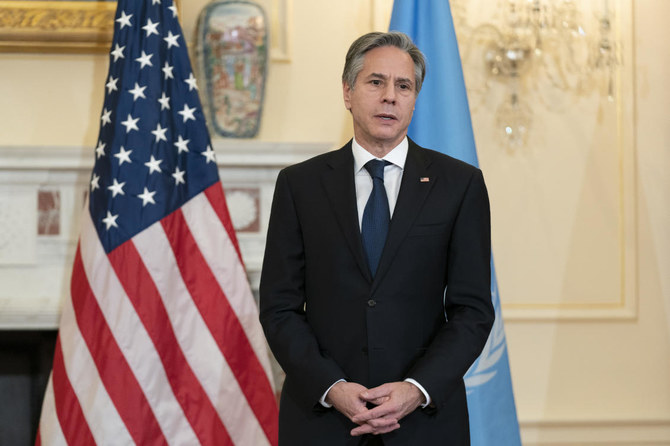
- Despite its importance in the US-China rivalry, Africa has often been overshadowed amid more pressing issues in Europe, Asia, the Middle East and even Latin America
Anti-war protesters leave USC after police arrive, while Northeastern ceremony proceeds calmly
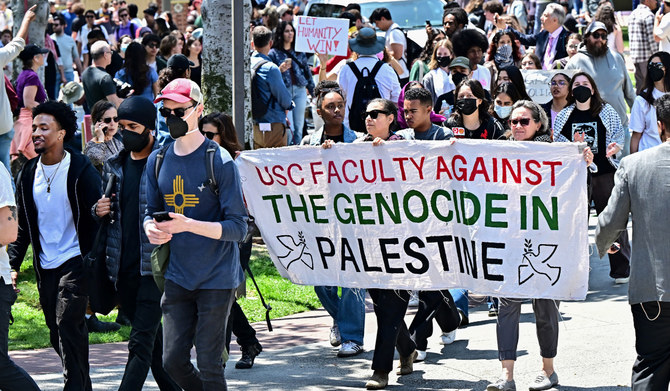
- Israel has killed more than 34,000 Palestinians, according to Gaza’s Health Ministry
WASHINGTON: Students protesting the war in Gaza abandoned their camp at the University of Southern California early Sunday after being surrounded by police and threatened with arrest, while Northeastern University’s commencement began peacefully at Boston’s Fenway Park.
Developments in both places were being watched closely following scores of arrests last month — 94 people at USC in Los Angeles and about 100 at Northeastern in Boston.
Dozens of Los Angeles Police Department officers arrived about 4 a.m. at USC to assist campus safety officers. The university had warned of arrests on social media and in person. Video showed some protesters packing up and leaving, while officers formed lines to push others away from the camp as it emptied out. The university said there were no reports of any arrests.
USC President Carol Folt said it was time to draw a line because “the occupation was spiraling in a dangerous direction” with areas of campus blocked and people being harassed.
“The operation was peaceful,” Folt wrote in an update. “Campus is opening, students are returning to prepare for finals, and commencement set-up is in full swing.”
USC earlier canceled its main graduation ceremony while allowing other commencement activities to continue.
At the Northeastern commencement Sunday, some students waved small Palestinian and Israeli flags, but were outnumbered by those waving the flags of India and the US, among others. Undergraduate student speaker Rebecca Bamidele drew brief cheers when she called for peace in Gaza.
The Associated Press has tallied about 2,500 people arrested at about 50 campuses since April 18, based on its reporting and statements from universities and law enforcement.
Arrests continued apace over the weekend. At the University of Virginia, there were 25 arrests Saturday for trespassing after police clashed with protesters who refused to remove tents. At the Art Institute of Chicago campus, police cleared a pro-Palestinian encampment hours after it was set up Saturday and arrested 68 people, saying they would be charged with criminal trespass.
ARRESTS IN VIRGINIA
In Charlottesville, Virginia, student demonstrators began their protest on a lawn outside the school chapel Tuesday. Video on Saturday showed police in riot gear and holding shields lined up on campus, while protesters chanted “Free Palestine.”
As police moved in, students were pushed to the ground, pulled by their arms and sprayed with a chemical irritant, Laura Goldblatt, an assistant professor who has been helping the demonstrators, told The Washington Post. The university said protesters were told that tents were banned under school policy and were asked to remove them.
Virginia Attorney General Jason Miyares told Fox News on Sunday the police response was justified because students had been warned repeatedly to leave, were violating the school’s conduct code, and that outsiders who were not students provided protesters with supplies like wooden barriers.
“We’ve seen folks that are not students show up in riot gear with bull horns to direct the protesters on how to flank our officers,” Miyares said.
He said some had put bear spray into water bottles and thrown them at officers.
It was the latest clash in weeks of protests and tension at US colleges and universities.
Tent encampments of protesters urging universities to stop doing business with Israel or companies they say support the war in Gaza have spread in a student movement unlike any other this century. Some schools reached agreements with protesters to end the demonstrations and reduce the possibility of disrupting final exams and commencements.
DEMONSTRATIONS AMID COMMENCEMENT
The University of Michigan was among the schools bracing for protests during commencement this weekend, as were Indiana University, Ohio State University and Northeastern. More ceremonies are planned in the coming weeks.
In Ann Arbor, there was a protest at the beginning of the event at Michigan Stadium. About 75 people, many wearing traditional Arabic kaffiyehs along with their graduation caps, marched up the main aisle toward the stage.
They chanted “Regents, regents, you can’t hide! You are funding genocide!” while holding signs, including one that read: “No universities left in Gaza.”
Overhead, planes pulled banners with competing messages. “Divest from Israel now! Free Palestine!” and “We stand with Israel. Jewish lives matter.”
Officials said no one was arrested, and the protest didn’t seriously interrupt the nearly two-hour event, attended by tens of thousands of people, some of them waving Israeli flags.
OTHER PROTESTS CONTINUE
At Indiana University, protesters urged supporters to wear their kaffiyehs and walk out during remarks by school President Pamela Whitten on Saturday evening. The Bloomington campus designated a protest zone outside Memorial Stadium, where the ceremony was held.
At Princeton University in New Jersey, 18 students began a hunger strike to try to push the university to divest from companies tied to Israel. Students at other colleges, including Brown and Yale, launched similar hunger strikes this year before the more recent wave of demonstrations.
The protests stem from the conflict that started Oct. 7 when Hamas militants attacked southern Israel, killing about 1,200 people, mostly civilians, and taking roughly 250 hostages. Vowing to destroy Hamas, Israel launched an offensive in Gaza that has killed more than 34,500 Palestinians, about two-thirds of them women and children, according to the Health Ministry in the Hamas-ruled territory. Israeli strikes have devastated the enclave and displaced most of its inhabitants.
China’s Xi in France for Macron talks on Ukraine
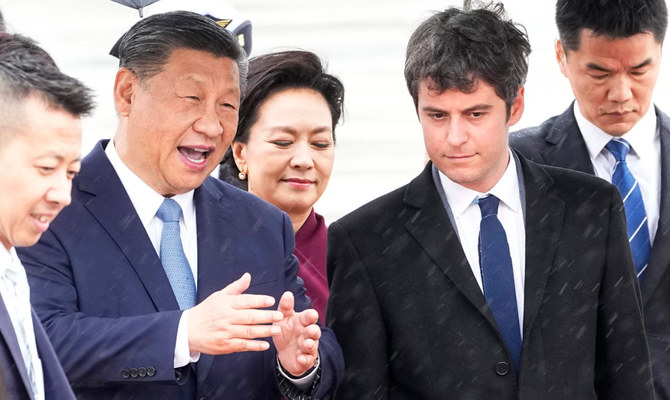
- Tuesday will see Macron take Xi to the Pyrenees mountains to an area he used to visit as a boy for a day of less public talks
PARIS: Chinese President Xi Jinping arrived in France Sunday on a state visit hosted by Emmanuel Macron where the French leader will seek to warn his counterpart against backing Russia in the conflict over Ukraine.
Xi’s arrival for the visit marking 60 years of diplomatic relations between France and China heralded the start of his first trip to Europe since 2019, which will also see him visit Serbia and Hungary.
But Xi’s choice of France as the sole major European power to visit indicates the relative warmth in Sino-French relations since Macron made his own state visit to China in April 2023 and acknowledges the French leader’s stature as an EU powerbroker.
The leader of the one-party Communist state of more than 1.4 billion people, accompanied by his wife Peng Liyuan, was welcomed under umbrellas at a drizzly Paris Orly airport by Prime Minister Gabriel Attal.
Xi is to hold a day of talks in Paris on Monday — also including EU Commission chief Ursula von der Leyen — followed by a state banquet hosted by Macron at the Elysee.
Tuesday will see Macron take Xi to the Pyrenees mountains to an area he used to visit as a boy for a day of less public talks.
In an op-ed for Le Figaro daily, Xi said that he wanted to work with the international community to find ways to solve the conflict sparked by Russia’s invasion of Ukraine, while emphasising that China was “neither a party nor a participant” in the conflict.
“We hope that peace and stability will return quickly to Europe and intend to work with France and the entire international community to find good paths to resolve the crisis,” he wrote.
A key priority of Macron will be to warn Xi of the danger of backing Russia, with Western officials concerned Moscow is already using Chinese machine tools in arms production.
Beijing’s ties with Moscow have, if anything, warmed after the invasion and the West wants China above all not to supply weapons to Russia and risk tipping the balance in the conflict.
“It is in our interest to get China to weigh in on the stability of the international order,” said Macron in an interview with The Economist published on Thursday.
Macron also said in the interview that Europe must defend its “strategic interests” in its economic relations with China, accusing Beijing of not respecting the rules on international trade.
But he acknowledged in an interview with the La Tribune Dimanche newspaper that Europeans are “not unanimous” on the strategy to adopt as “certain actors still see China essentially as a market of opportunities” while it “exports massively” to Europe.
The French president had gladdened Chinese state media and troubled some EU allies after his 2023 visit by declaring that Europe should not be drawn into a “bloc versus bloc” standoff between China and the United States, particularly over democratic, self-ruled Taiwan.
China views the island as part of its territory and has vowed to take it one day, by force if necessary.
Rights groups are urging Macron to bring up human rights in the talks, accusing China of failing to respect the rights of the Uyghur Muslim minority and of keeping dozens of journalists behind bars.
“President Macron should make it clear to Xi Jinping that Beijing’s crimes against humanity come with consequences for China’s relations with France,” said Maya Wang, acting China director at Human Rights Watch.
The group said human rights in China had “severely deteriorated” under Xi’s rule.
A crowd of protesters on Sunday unfurled a Tibetan flag at a demonstration in Paris, accusing Xi of being a “dictator” and wanting to erase local culture in the Tibet region, an AFP reporter said. Paris police put the number of protesters at two thousand.
However analysts are skeptical that Macron will be able to exercise much sway over the Chinese leader, even with the lavish red carpet welcome and a trip to the bracing mountain airs of the Col du Tourmalet over 2,000 meters (6,560 feet) above sea level on Tuesday.
The other two countries chosen by Xi for his tour, Serbia and Hungary, are seen as among the most sympathetic to Moscow in Europe.
“The two core messages from Macron will be on Chinese support to Russia’s military capabilities and Chinese market-distorting practices,” said Janka Oertel, director of the Asia program at the European Council on Foreign Relations.
“However, both messages are unlikely to have a significant impact on Chinese behavior: Xi is not on a mission to repair ties, because from his point of view all is well.”
Niger receives new Russian advisers, equipment
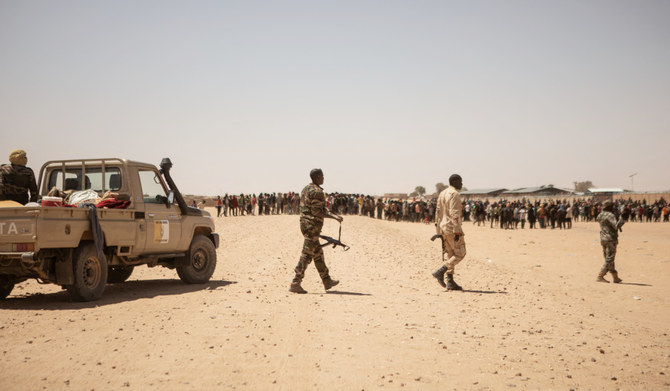
- US Defense Secretary Lloyd Austin indicated on Thursday that Russian troops were now installed at a Nigerien air base near the Niamey airport that also houses US troops
NIAMEY: New Russian military advisers and military equipment have arrived in Niger, according to state television in the African country that wants US forces to leave.
A first set of about 100 Russian advisers arrived in Niger on April 10, along with air defense systems.
Two military transporters arrived on Saturday, according to Tele Sahel that said Russia has now sent three cargo planes of military material and instructors in the past month.
The Africa Corps, seen as the successors of the Wagner paramilitary group in Africa, confirmed the instructors’ arrival in a posting on the group’s Telegram account.
FASTFACT
US Defense Secretary Lloyd Austin indicated that Russian troops were now installed at an air base near the Niamey airport that also houses US troops.
On Saturday, it said more trainers, equipment, and food products had arrived.
US Defense Secretary Lloyd Austin indicated on Thursday that Russian troops were now installed at a Nigerien air base near the Niamey airport that also houses US troops.
Niger’s military regime, which took power in a July 2023 coup, expelled French troops based in the country and then denounced a military cooperation agreement with the US.
It said this had been “unilaterally imposed” by Washington.
Washington agreed in April to withdraw roughly 1,000 soldiers from the country.
Negotiations are underway between the United States and Niger about the withdrawal.
US forces have a key drone base near Agadez, built at a cost of about $100 million.
Niger’s military leaders have moved closer to Russia, as have Mali and Burkina Faso, which also have military coup leaders and are fighting rebel groups affiliated with Al-Qaeda and Daesh.
In April, Idrissa Soumana Maiga, head of the private L’Enqueteur newspaper, was imprisoned after an article mentioned the “presumed” installation of Russian listening devices in official buildings.
Race against time to rescue Brazil flood victims after dozens killed

- The rainfall eased Saturday night but was expected to continue for the next 24-36 hours, with authorities warning of landslides
PORTO ALEGRE, Brazil: Authorities were racing against time on Sunday to rescue people from raging floods and mudslides that have killed more than 50 and forced nearly 70,000 to flee their homes in southern Brazil.
Viewed from the air, Porto Alegre, the capital of Rio Grande do Sul state, is completely flooded, with streets waterlogged and the roofs of some houses barely visible.
The Guaiba River, which flows through the city of 1.4 million people, reached a record high level of 5.09 meters, according to the local municipality, well above the historic peak of 4.76 meters that had stood as a record since devastating 1941 floods.
The water was still advancing into economically important Porto Alegre and around a hundred other localities, with increasingly dramatic consequences.
FASTFACT
The Guaiba River, which flows through the city of 1.4 million people, reached a record high level of 5.09 meters, according to the local municipality, well above the historic peak of 4.76 meters that had stood as a record since devastating 1941 floods.
In addition to some 70,000 residents forced from their homes, Brazil’s civil defense agency also said more than a million people lacked access to potable water amid the flooding, describing the damage as incalculable.
The agency put the death toll at 55, although that did not include two people killed in an explosion at a flooded gas station in Porto Alegre that was witnessed by an AFP journalist.
At least 74 people are also missing, it said.
Rosana Custodio, a 37-year-old nurse, fled her flooded Porto Alegre home with her husband and three children.
“During the night on Thursday the waters began to rise very quickly,” she told AFP via a WhatsApp message.
“In a hurry, we went out to look for a safer place. But we couldn’t walk … My husband put our two little ones in a kayak and rowed with a bamboo. My son and I swam to the end of the street,” she said.
Her family was safe but “we’ve lost everything we had.”
The rainfall eased Saturday night but was expected to continue for the next 24-36 hours, with authorities warning of landslides.
Authorities scrambled to evacuate swamped neighborhoods as rescue workers used four-wheel-drive vehicles — and even jet skis — to maneuver through waist-deep water in search of the stranded.
UK Labour official acknowledges electoral backlash over Gaza

- Analysis shows decline of nearly 18 percent in Labour vote in areas where over a fifth of the population are Muslim
LONDON: A senior Labour official on Sunday said the party has to recalibrate its campaigning strategy to win back voters opposing its position on Gaza, The Observer reported.
Pat McFadden, Labour’s national election coordinator, told the BBC program “Sunday with Laura Kuenssberg” that it would “work to get people’s support back,” and that the Middle East is a “high foreign policy priority” for the party.
Analysis has revealed that despite substantial gains in Thursday’s local elections in England, as well as Sadiq Khan securing a third term as mayor of London, there was a decline of nearly 18 percent in the Labour vote in areas of the country where over a fifth of the population identify as Muslim.
The analysis, conducted across 930 wards by Prof. Will Jennings from the University of Southampton, highlighted the extent of the protest vote against Labour leader Keir Starmer’s stance on Gaza, particularly his delay in calling for a ceasefire.
Ali Milani, chair of the Labour Muslim Network, voiced concern over the sense of betrayal within the Muslim community.
“We are now seeing the electoral consequence of that,” Milani told The Obsever. “If I was a Labour MP in Bradford or Birmingham or Leicester or parts of London or Manchester, I would be seriously concerned.”
Jennings said: “What this highlights is certainly that Labour is in an uncomfortable position on Gaza. And it is not just Muslim voters.
“But in a general election when we are looking at an anti-incumbent mood and there are fewer small parties and independents, we shouldn’t expect the pattern to be repeated.”
Labour MP Ellie Reeves said: “We have recognized the strength of feeling on this issue. We have called for an immediate ceasefire, we have also said there should absolutely be no ground offensive on Rafah.”
When questioned about Labour’s previous stance on the war, she told The Observer: “Keir Starmer has always been clear that our position would always respond to what is happening there.”



